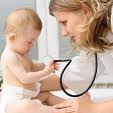الجوهرة المصونة
*****




المشاركات : 17164
العمـر : 36
تعاليق : مشرفة الطب والصحة
المزاج : 
الدولة : 
المهنة : 
الهواية : 
التسجيل : 10/10/2008
النقاط : 18248
التقييم : 501

 
توفيقك يارب

 |  موضوع: gastroenteritis in paediatrics موضوع: gastroenteritis in paediatrics  الأربعاء يوليو 14, 2010 2:42 pm الأربعاء يوليو 14, 2010 2:42 pm | |
| What Is It?
Gastroenteritis is an inflammation of the stomach and intestines that causes diarrhea, vomiting, nausea and other symptoms of digestive upset. In the industrialized world, the most common causes of gastroenteritis in children are viruses, bacteria (food poisoning), and intestinal parasites.
Viral gastroenteritis. In otherwise healthy children, viral infections of the digestive tract often are responsible for mild episodes of gastroenteritis. In the United States, the most common causes of viral gastroenteritis in children are rotaviruses, adenoviruses, enteroviruses (during summer months), astroviruses and Norwalk-like virus (norovirus). Rotaviruses are the most likely cause of infectious diarrhea in children under age 5. All of these viruses tend to spread on hands that have touched either an infected person's stool or surfaces contaminated with infected stool. For this reason, young children -- especially those just starting to learn good hygiene -- are particularly vulnerable to viral gastroenteritis. They may touch a dirty diaper (either their own or a playmate's), forget to wash their hands after using the toilet, put dirty fingers in their mouths, bite their fingernails, or chew and suck on toys that other children have touched with soiled hands. Parents and child-care personnel also can spread viral gastroenteritis from child to child, particularly if they do not wash their hands thoroughly after changing every soiled diaper. In addition, adults who have viral gastroenteritis themselves sometimes can spread their viral infections to children, especially if they prepare children's meals without first washing their hands. Occasionally, some of the viruses that cause viral gastroenteritis also have been found in drinking water or food, primarily in developing countries and rural areas where sanitation is poor. Norovirus has gotten plenty of press in recent years, mostly because of outbreaks of Norwalk-like viruses on cruise ships.
Bacterial gastroenteritis (food poisoning). Food that hasn't been prepared or stored properly can grow bacteria on its surface, and these bacteria sometimes produce irritating chemicals called toxins. If a child eats the germ-filled food, symptoms of gastroenteritis are triggered either by the bacteria themselves or by their irritating byproducts. In addition, certain types of aggressive bacteria, such as Campylobacter, Salmonella or E. coli 0157, can cause more severe forms of food poisoning that produce high fever, severe gastrointestinal symptoms and dehydration, even in children who are usually strong and healthy.
Intestinal parasites. Intestinal parasites can be spread to children on dirty hands, on the soiled surfaces of toys and bathroom fixtures, and in contaminated water or food. Giardia lamblia, the parasite that causes giardiasis, is the most common parasitic cause of diarrhea among children in the United States, especially those in child care centers.
Worldwide, gastroenteritis kills 3 million to 5 million children every year, primarily in developing nations where sanitation and health care are poor. Most of these children die from extreme dehydration (abnormally low levels of body water) resulting from a combination of severe diarrhea, vomiting and not drinking enough fluids. Even in the industrialized world, millions of episodes of gastroenteritis occur each year, especially in young children. In the United States, rotavirus infections used to be responsible for more than 3 million cases of gastroenteritis in children each year, with at least 50,000 hospitalizations and 20 to 40 deaths. Fortunately, the rotavirus vaccine that is given to young infants has really cut down the number of moderate to severe cases of rotavirus disease in the United States.
Overall, about 90% of children with gastroenteritis in the United States have such mild symptoms that they do not need to be treated by a doctor. Occasionally, however, gastroenteritis can lead to severe dehydration and other dangerous complications. This is more likely to happen in infants, children with chronic illnesses and children taking immune-suppressing medications.
Symptoms
In children, symptoms of gastroenteritis include:
Mild diarrhea
Abdominal pain
Cramps
Vomiting
Irritability (fussiness)
Poor appetite
Some children also have a low-grade fever or complain of a headache.
Diagnosis
To help make a diagnosis, your doctor may ask the following questions:
Has your child been exposed to an adult or child with diarrhea, especially in a day-care center or preschool setting?
Has your child played with a pet that is ill with gastrointestinal symptoms such as diarrhea?
Has your child touched pet reptiles? Reptiles, especially pet turtles, sometimes carry salmonella bacteria.
Has your child recently traveled to a developing country, been in any location where the drinking water is not tested routinely or been near potentially contaminated streams, lakes or swimming holes in the United States?
Did your child recently drink unpasteurized milk or apple cider, eat unwashed vegetables, or eat food that was left standing at room temperature for prolonged periods?
To help assess your child's risk of dehydration, your doctor also may ask questions related to your child's fluid intake and fluid losses over the past several hours. Specifically, you doctor may want to know about:
The number of episodes of vomiting
Whether your child can drink fluids without vomiting
The number of bowel movements
Whether your child's bowel movements are semi-solid, mildly "loose" or very watery
How often your child has been urinating, often measured as the number of wet diapers within the last 8 to 12 hours, or the number of bathroom trips to urinate
In most cases, a doctor diagnoses gastroenteritis and dehydration based on the symptoms, history of exposure to someone with diarrhea, spoiled food or impure water, and the results of a physical examination. Special tests rarely are needed unless your child has unusually severe symptoms, such as:
A high fever or fever that lasts longer than several days
Severe, watery diarrhea
Their skin color and whites of the eyes turn yellow
Signs of significant dehydration, including dry mouth, eyes and skin; no tears when crying; no wet diapers within the past 12 hours; a sunken "soft spot" a weak cry; unusual sleepiness or lack of body movement; and a sudden drop in weight, which can happen with the loss of body fluids in young children
Stool that contains blood or pus
Diarrhea that lasts more than two weeks
If more tests are needed, they may include blood tests to check for evidence of infection and dehydration, as well as other laboratory tests, such as a stool culture. In the lab, stool samples may be cultured for the presence of bacteria (especially Campylobacter, Salmonella, or, less commonly, E. coli 0157) or examined for microscopic parasites.
Expected Duration
In children, most cases of mild, uncomplicated gastroenteritis last about two to three days. However, even after most symptoms go away, your child may continue to have occasional loose stools for more than a week.
Prevention
It would be ideal never to get these infections in the first place and being up-to-date with your child's vaccines can help reach that goal. For example, young infants should receive the rotavirus vaccine, which has been shown to protect children against 85% to 98% of severe illness from rotavirus. There is also a hepatitis A vaccine now universally recommended for all toddlers 12 to 23 months of age.
In addition, to help prevent gastroenteritis in all members of your family, you can take the following steps:
Wash your hands frequently, especially after using the toilet, after changing diapers and after caring for a child with diarrhea.
Wash your hands before and after preparing food, especially after handling raw meat.
Wash diarrhea-soiled clothing in detergent and chlorine bleach. If bathroom surfaces are contaminated with stool, wipe them with a chlorine-based household cleaner.
Cook all meat thoroughly before you serve it to your family, and refrigerate leftovers within two hours.
Make sure you don't transfer cooked foods onto unwashed plates that held raw meat.
Wash kitchen countertops and utensils thoroughly after they have been used to prepare meat.
Never drink unpasteurized milk, unpasteurized apple cider or untreated water.
If you travel to an area where sanitation is poor, make sure that your family drinks only bottled water or soft drinks, and that they don't eat ice, uncooked vegetables or fruit that they haven't peeled themselves.
If your child attends day care, make sure that all day-care personnel wash their hands frequently, especially after changing soiled diapers and before preparing food. Also, check that your center follows pediatricians' standard recommendations for managing cases of diarrhea:
If a child develops diarrhea while in day care, notify the parent or guardian to take the child home as soon as possible.
Do not allow the sick child to return to day care until diarrhea has begun to improve.
Treatment
In otherwise healthy children, most cases of mild gastroenteritis gradually go away within a few days. In the meantime, you can try the following suggestions:
To prevent dehydration, encourage your child to drink plenty of fluids. Your doctor may recommend a particular brand of over-the-counter oral rehydration solution in addition to breast milk, formula or milk. In general, these solutions are better than soft drinks, fruit juice or other sweetened beverages, which usually have too many carbohydrates (sugar) and too little sodium (salt) to restore normal fluid balance in children with gastroenteritis.
If your child is too nauseated to drink his or her normal intake of fluids at one sitting, try offering several smaller sips more frequently over a longer period.
Once your child's vomiting subsides, resume a normal diet gradually while continuing the oral rehydration solution. Begin with lean meats and complex carbohydrates, such as rice, potatoes and bread. Temporarily avoid fatty foods and sugary beverages. If your child is breastfeeding, resume nursing as soon as possible.
Do not give your child anti-diarrhea medicines without checking with the doctor first. These medicines can interfere with the intestine's ability to pass harmful viruses, bacteria, parasites and toxins out of the body through the stool. This can make it harder to know when your child is actually getting sicker and needs more attention.
Have your child rest in bed until symptoms subside. Do not allow your child to return to school until diarrhea has begun to improve.
If your child is showing signs of significant dehydration and cannot drink fluids, your doctor will send him or her to the hospital to receive fluids intravenously (through a vein). Your child also may need to take antibiotics if stool tests confirm that a more serious bacterial infection is causing the gastroenteritis. For intestinal parasites, your doctor will prescribe an antimicrobial medication.
When To Call a Professional
Call your doctor promptly whenever an infant less than 2 months old has symptoms of gastroenteritis. For older children with diarrhea and vomiting, call your doctor if your child has any one of the following:
Stools that contain blood or pus, or stools that smell foul
Signs of dehydration
Blood or bile (greenish fluid) in the vomit
Severe abdominal pain or a distended (swollen) abdomen
Skin color and whites of the eyes turn yellow
A history of recent travel to a developing country or to any area where sanitation is poor
A chronic medical condition, especially any condition that weakens the immune system or is treated with immune-suppressing medication
Also, call your doctor promptly if your child is taking any oral medication for a chronic medical condition and is either too nauseated to swallow the medicine or has vomited after taking it. It is not good for children to miss doses of the medicines recommended by their doctors. Do not repeat any vomited doses of medicines without contacting your child's doctor.
Prognosis
Overall, the outlook is excellent. Almost all children with mild gastroenteritis recover completely without complications. | |
|
عاشقة الزهور
*****




المشاركات : 75737
العمـر : 41
المزاج : 
الدولة : 
المهنة : 
الهواية : 
التسجيل : 09/03/2009
النقاط : 101796
التقييم : 846
 |  موضوع: رد: gastroenteritis in paediatrics موضوع: رد: gastroenteritis in paediatrics  الخميس يوليو 15, 2010 12:10 pm الخميس يوليو 15, 2010 12:10 pm | |
| | |
|
الجوهرة المصونة
*****




المشاركات : 17164
العمـر : 36
تعاليق : مشرفة الطب والصحة
المزاج : 
الدولة : 
المهنة : 
الهواية : 
التسجيل : 10/10/2008
النقاط : 18248
التقييم : 501

 
توفيقك يارب

 |  موضوع: رد: gastroenteritis in paediatrics موضوع: رد: gastroenteritis in paediatrics  الثلاثاء أغسطس 24, 2010 10:25 am الثلاثاء أغسطس 24, 2010 10:25 am | |
| | |
|





